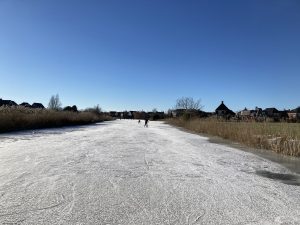3 To start of a short chapter about the winter
Pieter van der Veen
 Sounds of the winter too,
Sounds of the winter too,
Sunshine upon the mountains many a distant strain
From cheery railroad train from nearer field, barn, house,
The whispering air even the mute crops, garner’d apples, corn,
Children’s and women’s tones rhythm of many a farmer and of flail, An old man’s garrulous lips among the rest,
Think not we give out yet,
Forth from these snowy hairs we keep up yet the lilt.
(poem by Walt Whitman)
Winter, coldest season of the year, between autumn and spring; the name comes from an old Germanic word that means “time of water” and refers to the rain and snow of winter in middle and high latitudes. In the Northern Hemisphere it is commonly regarded as extending from the winter solstice (year’s shortest day), December 21 or 22, to the vernal equinox (day and night equal in length), March 20 or 21, and in the Southern Hemisphere from June 21 or 22 to September 22 or 23. The low temperatures associated with winter occur only in middle and high latitudes; in equatorial regions, temperatures are almost uniformly high throughout the year. For physical causes of the seasons, see season.
The concept of winter in European languages is associated with the season of dormancy, particularly in relation to crops; some plants die, leaving their seeds, and others merely cease growth until spring. Many animals also become dormant, especially those that hibernate; numerous insects die.
There are about ten Sámi languages alive today, spoken across the northern parts of Scandinavia and eastern Russia. But they are among the many Indigenous languages around the world that are at risk of disappearing.
50 Words for Snow is the title track from Kate Bush’s album of 2011, featuring Stephen Fry .
The lyrics contain words that do exist in the Eskimo’s language, but eventually things get out of hand, leave that to Fry (and Bush).
Is boomerangablanca an Eskimo’s word?
